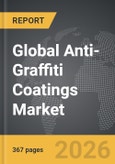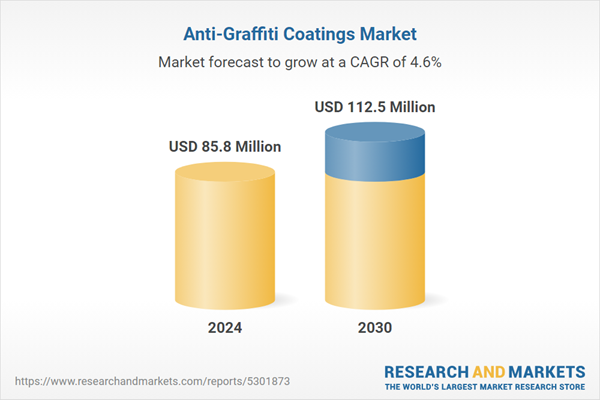Global Anti-Graffiti Coatings Market - Key Trends and Drivers Summarized
Why Are Anti-Graffiti Coatings Becoming Essential for Urban Infrastructure?
Anti-graffiti coatings have emerged as an essential solution for preserving urban infrastructure and public spaces from the widespread issue of graffiti vandalism. But why are these coatings so important in today's cities? As urbanization continues to expand, graffiti vandalism has become a significant problem for city planners, property owners, and businesses. Removing graffiti from buildings, public transport, monuments, and other structures is not only time-consuming but also expensive, often leading to repeated cleaning efforts that degrade surfaces over time. Anti-graffiti coatings are designed to prevent graffiti from adhering to surfaces or to make its removal far easier without damaging the underlying material. These coatings come in various forms, including sacrificial, permanent, and semi-permanent options. Sacrificial coatings form a temporary layer that is removed along with the graffiti and then reapplied, while permanent and semi-permanent coatings provide long-term protection against repeated vandalism. The importance of these coatings has grown as cities seek to maintain cleaner, more welcoming environments without the need for continuous, costly graffiti removal efforts.What Safety and Environmental Considerations Affect Anti-Graffiti Coatings?
While anti-graffiti coatings are highly effective in combating urban vandalism, they also raise questions about environmental impact and safety. Historically, many coatings contained harsh chemicals and solvents that could be harmful to both the applicators and the surrounding environment, particularly when used in large-scale applications such as on bridges, railways, and public buildings. However, as environmental awareness has increased, manufacturers have made significant strides in developing more eco-friendly coatings. Today, many anti-graffiti coatings are formulated to be water-based, free of harmful volatile organic compounds (VOCs), and biodegradable, reducing their impact on the environment. These environmentally-friendly products align with growing regulatory demands for sustainability and the protection of air and water quality. Additionally, safety for those applying these coatings has also improved, with products now designed to be less toxic and easier to apply without requiring extensive personal protective equipment (PPE). This shift towards safer, more sustainable anti-graffiti coatings reflects broader trends in the coatings industry, where environmental regulations and public health concerns are driving innovation.How Are Anti-Graffiti Coatings Evolving to Meet New Urban Challenges?
As cities become more advanced and urban spaces more complex, anti-graffiti coatings are evolving to meet new challenges and demands. Early anti-graffiti coatings often had limited durability and required frequent reapplication, which increased maintenance costs and sometimes altered the appearance of the protected surfaces. Modern formulations, however, offer far greater durability, providing long-lasting protection against a variety of graffiti materials, including spray paint, markers, and stickers. These coatings are now tailored for use on a wide range of surfaces, including concrete, metal, wood, glass, and plastic, allowing for more versatile application across different types of infrastructure. Technological advancements have also enabled the development of invisible coatings that preserve the original appearance of surfaces while offering robust graffiti resistance. In addition, nano-coatings have emerged as a cutting-edge solution in the market, creating ultra-thin protective layers that prevent even the smallest paint particles from bonding to surfaces. These developments have not only improved the effectiveness of anti-graffiti coatings but also made them more attractive to property owners and municipalities looking to preserve the aesthetic and structural integrity of their buildings and monuments. Moreover, as public spaces are increasingly becoming interactive and multifunctional, anti-graffiti coatings now need to account for frequent cleaning, foot traffic, and weather exposure, all of which require enhanced resilience and longevity.What's Driving the Growth of the Anti-Graffiti Coatings Market?
The growth in the anti-graffiti coatings market is driven by several factors, including rising urbanization, increased government spending on infrastructure maintenance, and growing consumer demand for sustainable, cost-effective solutions to graffiti management. One of the most significant drivers of this market is the increasing global trend of urbanization, with more people moving to cities and urban areas continuing to expand. As cities grow, so does the need for well-maintained public spaces, which are often targets of graffiti vandalism. Governments and municipalities are investing more in urban beautification projects and infrastructure upkeep, creating a substantial demand for anti-graffiti coatings to protect public assets like transportation systems, parks, and historical monuments. Another major factor is the growing focus on sustainability and eco-friendly products, which has influenced both consumer and regulatory preferences. As environmental regulations become stricter, especially in regions like North America and Europe, there is a growing demand for non-toxic, low-VOC, and biodegradable anti-graffiti coatings that meet these standards. The development of more durable, long-lasting coatings has also boosted market growth, as property owners and governments seek to reduce maintenance costs by opting for products that provide extended protection with minimal upkeep. Furthermore, the rising awareness among businesses and property managers about the importance of maintaining clean, graffiti-free exteriors to enhance customer perception and property value has contributed to the increasing adoption of anti-graffiti solutions. These factors, combined with technological advancements in coating formulations, are shaping a market that continues to expand as cities and businesses seek innovative ways to combat graffiti vandalism effectively.Report Scope
The report analyzes the Anti-Graffiti Coatings market, presented in terms of market value (US$ Thousand). The analysis covers the key segments and geographic regions outlined below.- Segments: Type (Anti-Graffiti Coatings, Anti-Graffiti Films); Vehicle Type (Water-based, Other Vehicle Types); End-Use (Construction, Transportation).
- Geographic Regions/Countries:World; United States; Canada; Japan; China; Europe (France; Germany; Italy; United Kingdom; Spain; Russia; and Rest of Europe); Asia-Pacific (Australia; India; South Korea; and Rest of Asia-Pacific); Latin America (Argentina; Brazil; Mexico; and Rest of Latin America); Middle East (Iran; Israel; Saudi Arabia; United Arab Emirates; and Rest of Middle East); and Africa.
Key Insights:
- Market Growth: Understand the significant growth trajectory of the Anti-Graffiti Coatings segment, which is expected to reach US$91.3 Million by 2030 with a CAGR of a 4.7%. The Anti-Graffiti Films segment is also set to grow at 4.1% CAGR over the analysis period.
- Regional Analysis: Gain insights into the U.S. market, valued at $22.5 Million in 2024, and China, forecasted to grow at an impressive 7.1% CAGR to reach $24.2 Million by 2030. Discover growth trends in other key regions, including Japan, Canada, Germany, and the Asia-Pacific.
Why You Should Buy This Report:
- Detailed Market Analysis: Access a thorough analysis of the Global Anti-Graffiti Coatings Market, covering all major geographic regions and market segments.
- Competitive Insights: Get an overview of the competitive landscape, including the market presence of major players across different geographies.
- Future Trends and Drivers: Understand the key trends and drivers shaping the future of the Global Anti-Graffiti Coatings Market.
- Actionable Insights: Benefit from actionable insights that can help you identify new revenue opportunities and make strategic business decisions.
Key Questions Answered:
- How is the Global Anti-Graffiti Coatings Market expected to evolve by 2030?
- What are the main drivers and restraints affecting the market?
- Which market segments will grow the most over the forecast period?
- How will market shares for different regions and segments change by 2030?
- Who are the leading players in the market, and what are their prospects?
Report Features:
- Comprehensive Market Data: Independent analysis of annual sales and market forecasts in US$ Million from 2024 to 2030.
- In-Depth Regional Analysis: Detailed insights into key markets, including the U.S., China, Japan, Canada, Europe, Asia-Pacific, Latin America, Middle East, and Africa.
- Company Profiles: Coverage of players such as 3M Comapny, A&I Coatings, Avery Dennison Corporation, Axalta Coating Systems, CSL Silicones Inc. and more.
- Complimentary Updates: Receive free report updates for one year to keep you informed of the latest market developments.
Some of the 43 companies featured in this Anti-Graffiti Coatings market report include:
- 3M Comapny
- A&I Coatings
- Avery Dennison Corporation
- Axalta Coating Systems
- CSL Silicones Inc.
- DuluxGroup
- Edge Film Technologies
- Evonik Industries
- Fabrino
- FSC Coatings, Inc
- Graffiti Shield
- Hydron Protective Coatings
- Mactac
- Madico
- Merck Group
- Monopole Inc.
- Nanokote
- Opalux
- Prosoco
- Rainguard
- Ricochet Protects
- Rust-Oleum
- SEI Industrial Chemicals
- Sika AG
- Solar Art
- SSAB
- Suntek
- Teknos Group
- The Sherwin-Williams Company
- TK Products
- Vexcon Chemicals
- Wacker Chemie
This edition integrates the latest global trade and economic shifts into comprehensive market analysis. Key updates include:
- Tariff and Trade Impact: Insights into global tariff negotiations across 180+ countries, with analysis of supply chain turbulence, sourcing disruptions, and geographic realignment. Special focus on 2025 as a pivotal year for trade tensions, including updated perspectives on the Trump-era tariffs.
- Adjusted Forecasts and Analytics: Revised global and regional market forecasts through 2030, incorporating tariff effects, economic uncertainty, and structural changes in globalization. Includes historical analysis from 2015 to 2023.
- Strategic Market Dynamics: Evaluation of revised market prospects, regional outlooks, and key economic indicators such as population and urbanization trends.
- Innovation & Technology Trends: Latest developments in product and process innovation, emerging technologies, and key industry drivers shaping the competitive landscape.
- Competitive Intelligence: Updated global market share estimates for 2025, competitive positioning of major players (Strong/Active/Niche/Trivial), and refined focus on leading global brands and core players.
- Expert Insight & Commentary: Strategic analysis from economists, trade experts, and domain specialists to contextualize market shifts and identify emerging opportunities.
Table of Contents
Companies Mentioned (Partial List)
A selection of companies mentioned in this report includes, but is not limited to:
- 3M Comapny
- A&I Coatings
- Avery Dennison Corporation
- Axalta Coating Systems
- CSL Silicones Inc.
- DuluxGroup
- Edge Film Technologies
- Evonik Industries
- Fabrino
- FSC Coatings, Inc
- Graffiti Shield
- Hydron Protective Coatings
- Mactac
- Madico
- Merck Group
- Monopole Inc.
- Nanokote
- Opalux
- Prosoco
- Rainguard
- Ricochet Protects
- Rust-Oleum
- SEI Industrial Chemicals
- Sika AG
- Solar Art
- SSAB
- Suntek
- Teknos Group
- The Sherwin-Williams Company
- TK Products
- Vexcon Chemicals
- Wacker Chemie
Table Information
| Report Attribute | Details |
|---|---|
| No. of Pages | 367 |
| Published | February 2026 |
| Forecast Period | 2024 - 2030 |
| Estimated Market Value ( USD | $ 85.8 Million |
| Forecasted Market Value ( USD | $ 112.5 Million |
| Compound Annual Growth Rate | 4.6% |
| Regions Covered | Global |









